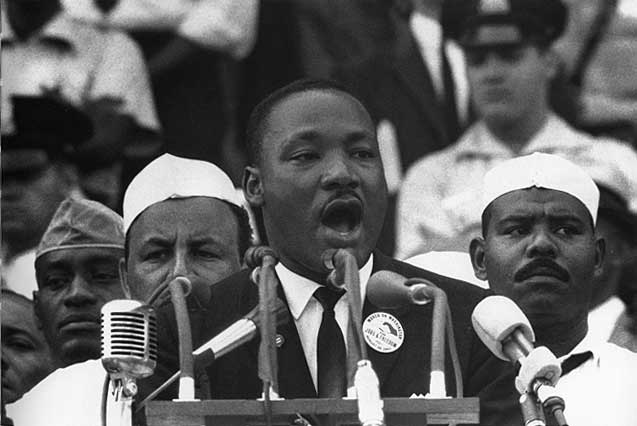This January, millions of school children will honor Dr. Martin Luther King Jr.’s legacy with lessons on kindness and service. People on both sides of the partisan divide will invoke his spirit, repeating versions of his inspiring “I Have a Dream” speech and remembering his selfless sacrifice for racial equality. Yet, this soft, comforting image of Brother Martin is a muted version of the fiery activist who was widely disliked during his lifetime.
The Civil Rights leader is also remembered for his advocacy of nonviolence. However, King’s nonviolence wasn’t inaction and it certainly wasn’t passive. It was a tool designed to generate outrage on the part of most Americans and turn public opinion away from those who used brutal tactics to quell Black protest. On Bloody Sunday, March 7, 1965, 600 peaceful protestors were violently attacked while crossing the bridge into Selma, Alabama. The event was captured on film and broadcast across the nation, galvanizing support for voting rights.
King and his allies took direct action against unfair systems, organizing boycotts, disobeying unjust laws, and assembling powerful coalitions to pressure political leaders and economic structures. This is the example Dr. Martin Luther King Jr. set–one which we must learn from and emulate.

The path toward MLK Day and a martyr’s image
Just days after his assassination on April 4, 1968, legislation to honor King with a federal holiday was introduced. It would take 15 years of persistent campaigning by the Civil Rights leader’s widow, Coretta Scott King, a popular appeal from singer Stevie Wonder, and a shift in popular opinion to achieve success. In 1983, over the public objections of Sen. Jesse Helms of North Carolina and his own private reservations, President Ronald Reagan signed the law establishing the Dr. Martin Luther King Jr. holiday.
During the signing ceremony, Reagan spoke as if racism in the U.S. disappeared when Black Americans were guaranteed the right to vote. “Across the land, people had come to treat each other not as blacks and whites, but as fellow Americans,” he said. In later speeches, Reagan would use King’s words about not judging people by the color of their skin as an argument against affirmative action–contrary to King’s views that equity measures were necessary to remedy continuing and historical oppression.
Equal opportunity for all is a goal worth fighting for

Those supporting the status quo and traditional power structures aren’t interested in the societal change that King fought for. But people belonging to marginalized communities and their allies know that the fight isn’t over. We sometimes forget that everyone has the power to spark change.
This January, let us reacquaint ourselves with the radical King, a warrior for justice who didn’t sit complacently with his accomplishments. Not content with the passage of the Civil Rights Act of 1964 and the Voting Rights Act of 1965, King set his sights on the next challenge: greater socioeconomic equality for all. In December 1964, the day after he returned from accepting the Nobel Peace Prize, King joined a picket line at Atlanta’s Scripto Pen factory, where workers were striking for better wages. At the same time, King was advocating for peace in Vietnam and massive public aid to reduce poverty.
What can all of us learn from Dr. Martin Luther King Jr.?
In many parts of the United States, MLK Day is widely observed as a National Day of Service. This is important work that alleviates suffering and helps underserved communities thrive. But are there other, more lasting actions, that we can take to create a more just and equitable society? While MLK Day rightly commemorates a great leader, let us continue his work throughout the year. As you contemplate what that means personally, here are five lessons from King’s life:
- Avoid performative allyship; take action to oppose unjust power structures. Much has been made of the Civil Rights Movement and its reliance on nonviolence, implying that demonstrations alone can create meaningful change. Mass events are useful when it comes to creating camaraderie and strengthening coalitions, but justice requires action. Give to or volunteer with nonprofits in your community that address the roots of poverty; run for a local political office; or advocate for fair housing at your local planning and zoning board.
- Use your power (and privilege) to advocate for others. King’s most potent tool was his voice, his intellect, and his ability to inspire others. What are your skills? Can you help build homes with Habitat for Humanity? Can you mentor entrepreneurs or students from underserved communities?
- Build coalitions to advance goals. In Montgomery, Alabama, the bus boycott succeeded because the entire population of Black residents refused to ride the buses. Real progress is only possible when people work together–even across differences–for the common good. King enlisted the support of religious leaders and civil rights activists across the country. They didn’t always agree on tactics, but they were united in the fight.
- Understand that change requires sacrifice. Over the 13 months of the bus boycott, Black Americans walked sometimes 10 miles to and from work, getting up before dawn and returning home late into the night. They succeeded in desegregating Montgomery’s buses because the transit companies felt the loss of income. To create change today, posting on social media isn’t enough. We have to identify businesses and organizations that are opposed to our fundamental values and refuse to support them financially. According to Neilsen, Black spending power in the U.S. is more than $1.5 trillion–yes, trillion. Be intentional when you’re spending your money, so you can put economic power in the hands of the underrepresented and those who advocate for their causes.
- Be persistent, even when there are setbacks. Perhaps King’s most enduring and important lesson is his dedication and faith in the face of violence, arrests, and threats. Real change takes time, action, and persistence.
On MLK Day and throughout the year, be inspired by King’s words, but more importantly, follow the example of his actions and work for justice and equality for all.
Amber Keister is a Content Strategist at The Diversity Movement. She has spent more than 20 years as a journalist for publications throughout the South. Connect with her on Linkedin.




